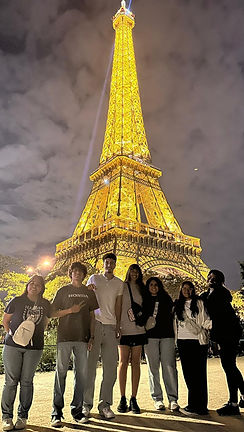
UNCG Biology
Evolutionary Medicine and Paleopathology Field School
BIO 466 (6 credit hours)
May 15-25 on campus and online; May 28-June 12, 2024 in Italy, France, UK
$5,152 program fee = tuition for 6 hours, fees, lodging, in-country transportation, activities, tickets, and some meals
Not included: Airfare to Europe, most meals, and spending money ($2500-3000)
The Evolutionary Medicine and Paleopathology Field School has three foci: 1) the natural history of infectious diseases in Europe for the past millennium; 2) co-evolutionary processes between humans and our pathogens; and 3) the history of medicine, anatomical dissection, and ethical issues in Europe from the Renaissance to the modern period. Dr. Gwen Robbins Schug will teach students the foundational knowledge of evolutionary medicine and paleopathology at UNCG prior to traveling to Europe. We will visit Italy, France, and the UK (Scotland and England) to learn first-hand about the evolution of infectious pathogens, their history and effects on the body throughout modern history.
Students will delve in depth into the biology, evolution, and natural history of The Black Death, syphilis, leprosy, and tuberculosis. The course will also focus on the history of medicine and bioethics of working with human remains. Field trips and activities will examine the historical and social context of Europe from the Renaissance to the modern period, the history of medicine and mental illness, the natural history and pathology of infectious diseases, and both the treatments and the stigmatization of disease and its sufferers. We will focus on how socio-cultural variables shaped health and medical practice in northeastern Italy, France, and the UK. We will learn about the history of anatomical sciences and dissection, the first quarantine stations, and public health in a pandemic context. Specifically, we will visit a medical history museum, lazarettos (the first quarantine stations), historic insane asylums, and ospedales (hospitals) in Venice; we will learn about pathology from museums in Padua and Edinburgh; we will visit the anatomical theater of Vesalius, the world’s first Botanical Garden for herbal remedies, and see examples of pathology in Renaissance paintings; and we will study evidence for pathology in human skeletons of people who had infectious disease.
This program is intended to build students' competency in evolutionary and biocultural thinking about medicine, the process of scientific research, critical and creative thinking skills, openness and self-awareness through cross-cultural interaction and competency, and a broader vision of historical forces and human diversity through time. Lodging, transportation in Europe, instruction at UNCG and in Europe, all tickets and excursions included. Airfare and most meals not included.
Learn more about Dr. Gwen Robbins Schug's research. Syllabus and more information available on request.









Explore
The history of medicine has its foundation in northeastern Italy. Learn about Galen, Vasalius, Hunter and the origins of modern concepts of health, disease, and mental illness. Visit La Scuola Grande Medical Museum, the University of Padua Pathology Museum, and Palazzo Bo--the anatomical theater where Vesalius performed his dissections. We will focus on ethics and how we can build an anti-racist and more just future for health care through an awareness of our history and a goal of reparations for past wrongs.

Learn
Evolutionary theory is a deeply valuable framework for understanding human diseases and environmental health. We will travel to Lazaretto Nuovo and Lazaretto Vecchio, where the quarantine concept was invented. We will study the history of The Black Death, Syphilis, Leprosy, and Tuberculosis in Venice and how disease spillover is connected to biocultural factors, culture contact, and social organization. We will study the evolution and genetics of these pathogens, the impact of infection on the body, and the natural history of these re-emerging diseases.
_edited.png)
Research
We will learn human osteology, paleopathology of infectious diseases, and how skeletal and genetic data can converge. We will work with skeletons from human anatomical collections to re-personalize and tell the story of marginalized people who were caught in the socio-cultural, historical, and economic forces that drove them winding up in teaching labs without their consent in the 19th-20th centuries. Their remains tell the story of what it means to be poor, from under-represented communities, or inconvenient in modern society.